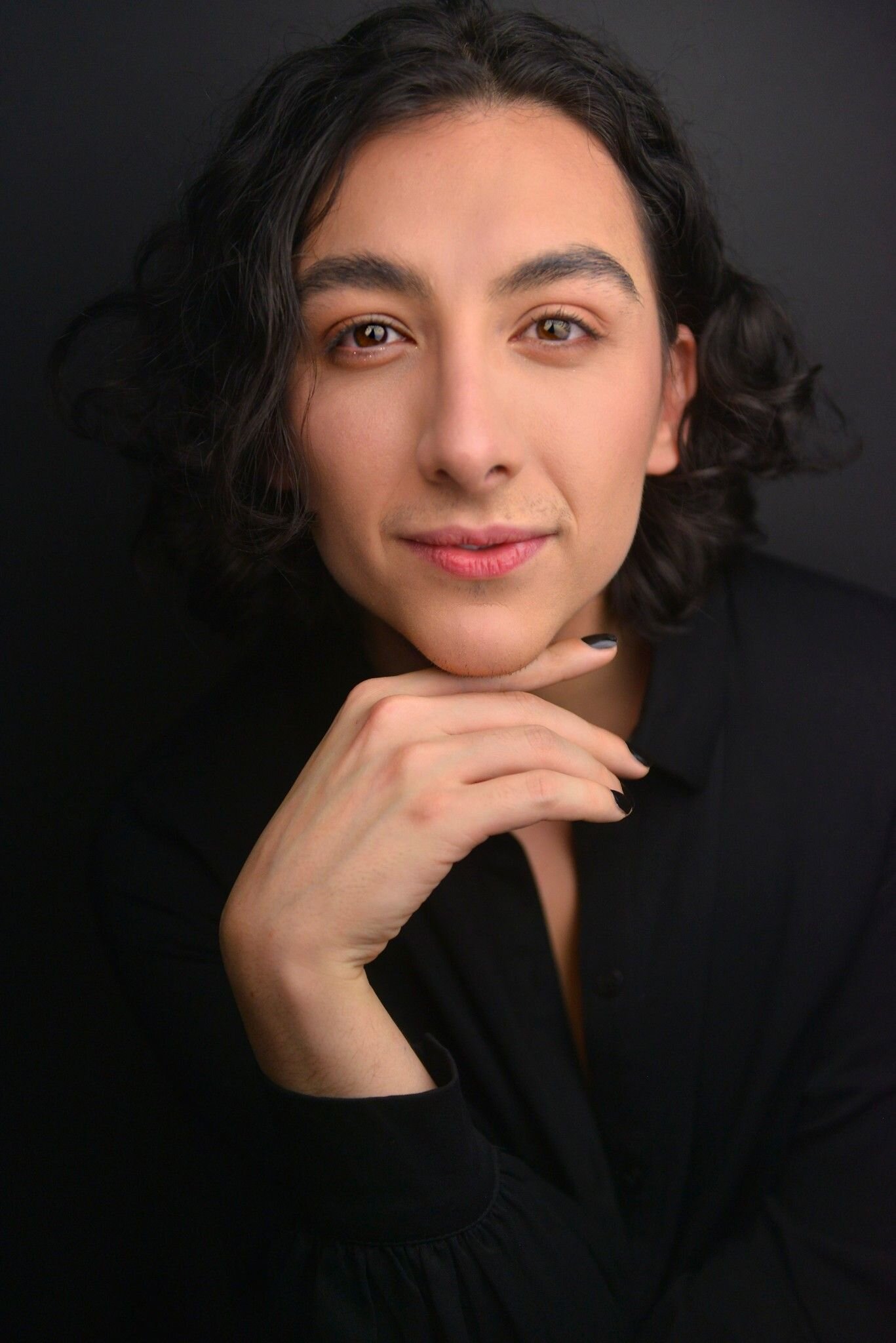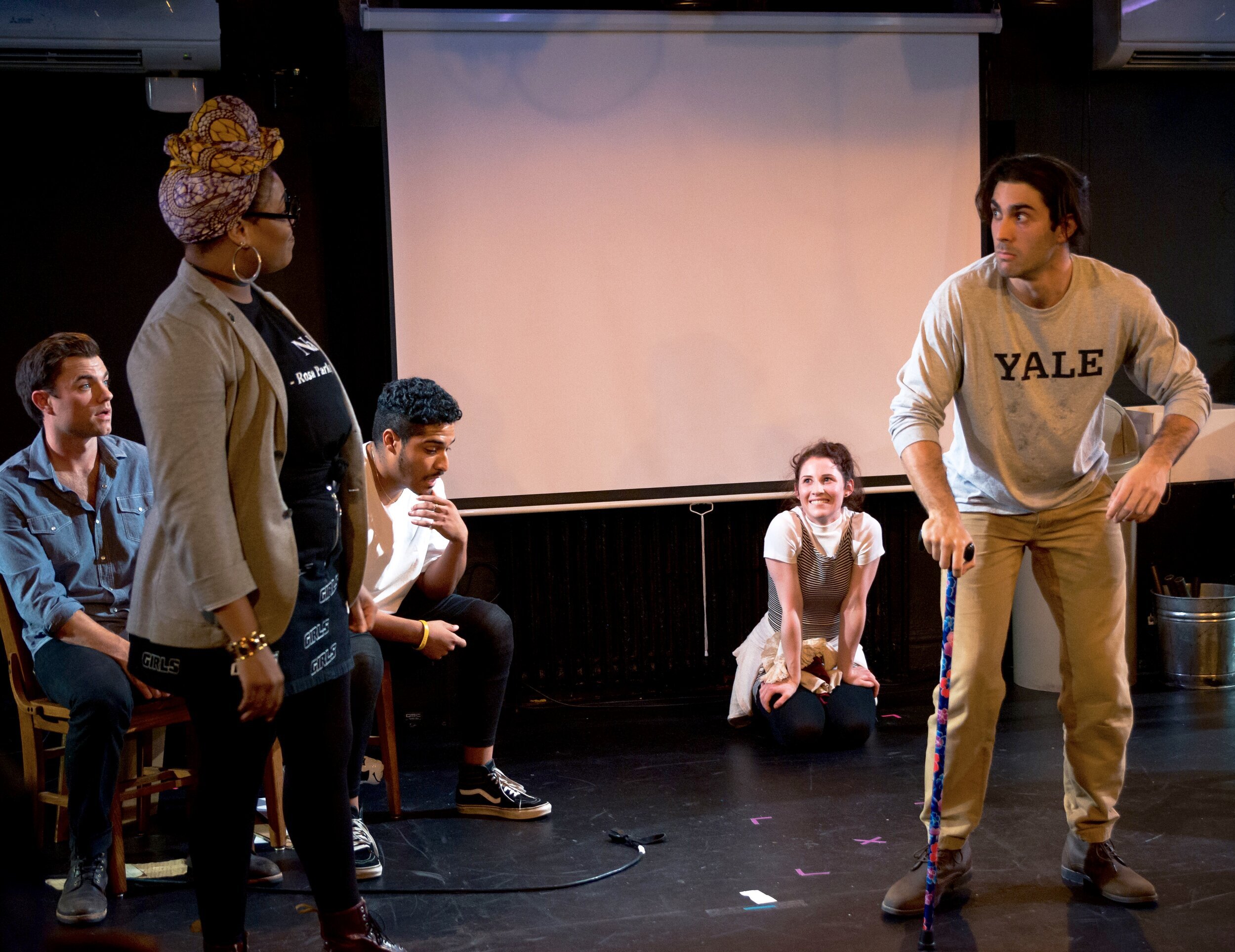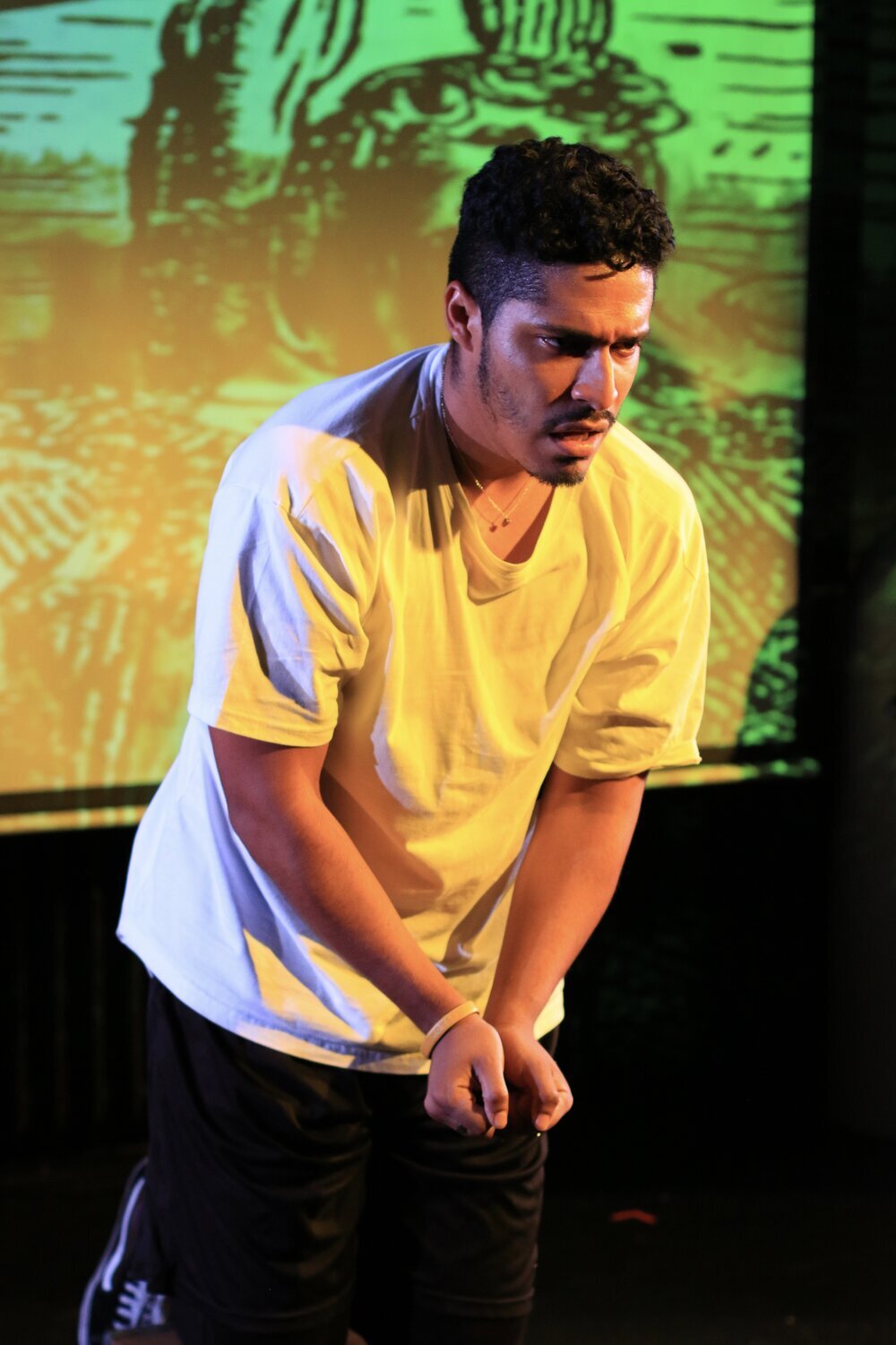Review of littleboy/littleman, Yale Cabaret
A first year playwright at the Yale School of Drama, Rudi Goblen demonstrates, in littleboy/littleman, a captivating exuberance of language. Two half-brothers, Bastian (Dario Ladani Sanchez), the elder, and Fito (Robert Lee Hart) share an apartment together—or rather, Bastian suffers Fito to stay in his apartment, on the couch. The play opens with Fito, alone in the apartment, rehearsing his street performance act, complete with red cones to separate the crowd from the playing space. The audience at the Cab stands in for the one in his head as he coaches us how to respond, urging us to—whether we like the show or not—make some noise.
Fito is making noise, and that’s one of the things Bastian will harangue him about, at length. Fito, able to give as good as he gets, will use any pretext to launch into tirades of his own, whether about a cop—a former bullying classmate of Bastian—who harasses him, or about a (literally) shitty job Bastian insists he take to help defray the costs of inhabiting the apartment (and don’t get him started on having to clean ladies’ lavatories). When he’s not lecturing Fito about not pulling his weight, Bastian can be seen and heard on a headset, either trying to find out about the delay in his petition for a name-change or trying to hoodwink clients for a “donation” to a police program to fight drugs and juvenile crime. Bastian’s impending name-change spurs some comic badinage between the brothers about ridiculous names but also gives Bastian an occasion to lecture his brother about how a Nicaraguan name is a handicap in job applications.
Like Stephen Adly Guirgis, Goblen is a playwright with a good ear for street-speak as Fito employs a mix of hiphop rhythms and Spanish phrases and, like Guirgis, Goblen likes to let his characters talk. In addition to their individual routines, Fito and Bastian share a reminiscence of a home invasion that took their grandmother’s life and left them permanently traumatized. But it’s really the fate of their mother that has unmoored the brothers. When Fito waxes poetic about the sacrifices their late mother endured in smuggling her two young sons and their grandmother into the States from Nicaragua and then raising them on her own, Bastian snaps back about the fact that Fito contributed nothing to their mother’s last days and throws him out.
There follows another street performance from Fito with audience participation (the night I saw the show, Ilia Isorelýs Paulino, recently seen as Alice in Alice, the third show in the Yale School of Drama season, chose between a magic quarter and a piece of paper) and a collection at the close. The piece of paper contains a poem, a litany of situations summed up as “It’s all just a bag of halos and horns,” and offered as “a toast,/to us.”
I thought the show would end there, but we still have Fito’s final confrontation with that bullying police officer and the outcome of Bastian’s name-change to go. Goblen’s play comes packed with incident and overflows with speech. It aims for the company of other notable plays in which two males navigate a fraught relationship colored by street tensions and a variable grasp of how to get along—such as Suzan-Lori Parks’ Topdog/Underdog and Antoinette Nwandu’s Pass Over—though here the status of both brothers as immigrants adds a further timely dimension.
The wealth of material in littleboy/littleman may feel a bit overwhelming in the compass in which its offered. Or perhaps a full-length play has been crammed into the Cab’s shorter running time. In any case, there could be more: it would be good to see Fito somewhere other than the apartment and the street; and with all the evocation of the mother going on, we feel the lack of a scene or two in which we get to see her for ourselves.
What really resonates here is Robert Lee Hart’s full command of Fito. He so inhabits the role that there seems no division between himself and his character, and that makes Fito’s scenes more vivid at times than the play he’s a part of. Dario Ladani Sanchez puts across the way in which Bastian, for all his better grasp of pragmatic realities, is overshadowed by his brother’s spirit. He’s best when he’s on a headset, trying to use his whitest voice to steer some cash his way.
Hart and Sanchez—who played off one another as antagonists in Seven Spots on the Sun in YSD’s 2018-19 season—make the most of Goblen’s way with words and make us believe in their grudging intimacy. Marcelo Martínez García’s set, which includes musicians on a drumkit and a bass guitar (the latter is used to great effect as the other end of a phone conversation Bastian gets caught up in), gives us a ratty apartment that’s also the street, while Emma Deane’s lighting design is—well—spot on. Second-year director Christopher D. Betts—in his third play of the Cabaret’s 52nd season—keeps the action very mobile, showing again his inspired grasp of how to use the Cab’s amorphous space to enhancing effect.
littleboy/littleman
By Rudi Goblen
Directed by Christopher D. Betts
Set Designer: Marcelo Martínez Garcia; Costume Designer: Stephanie Bahniuk; Lighting Designer: Emma Deane; Sound Designer: Anteo Fabris; Technical Director: Cam Camden; Producers: Sami Cubias & Caitlin M. Dutkiewicz; Stage Manager: Leo Egger
Musicians: Margaret E. Douglas, Tyler Cruz
Cast: Robert Lee Hart, Dario Ladani Sanchez
Yale Cabaret
February 13-15, 2020
















